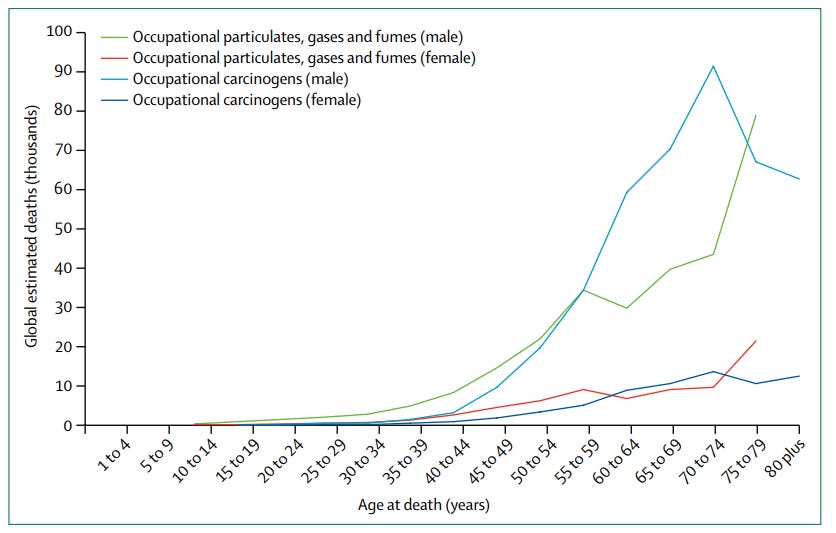Lancet Says 1 in 6 Worldwide Deaths by Pollution: 67% More Than Coronadoom
You've seen the headline, "World Ends: Favored Victims Hardest Hit," and you've laughed. The Noble Victims differ, slightly, by country. There is no class of being nobler or respected or reverenced than the Victim. That's what gives the joke it zing.
Here's another version of the joke: "Pollution Kills 1 in 6 in the World: Most Prevalent Among Minorities and the Marginalised."
Marginalised isn't an exact synonym of Victim here, but the joke is no less funny for that. And for appearing in the peer-reviewed review paper, "The Lancet Commission on pollution and health."
Incidentally, the laughter is amplified when you recall that whites are a minority in the world. Tell that to whoever reads this paper and watch them take delight in the humor.
Today I'll say only a few words about this paper. The size of the paper makes it difficult to do anything else. The paper itself has a dozen or three authors, and runs to fifty one shiny pages. It cites a large number of papers.
Here's paper number 1: Rockstrom J, Steffen W, Noone K, et al. A safe operating space for humanity. Nature 2009; 461: 472–75.
Safe space?
And here's number 418: Duflo E, Greenstone M, Pande R, Ryan N. Truth-telling by third-party auditors and the response of polluting firms: experimental evidence from India. Q J Econ 2013; 128: 1499–545.
Truth-telling?
Add up all the authors in those citations and you get a number somewhere between one and two thousand. Add up the authors cited by each of the 418 papers gives, I don't know, something with five figures. Minimum.
The number of total pages? At, say, 20 per, with supplementary material, which is now common, is ten to the three. At least.
All this effort, with a combined number of years of labor (you figure out how many), to say these three little words: pollution is bad.
Well, and so it is. Who is "for" pollution? Who stands and says, and is cheered for saying, "What we need is more pollution!" How often have you read, "Ackshually, pollution is good for you"?
So pollution is bad. Yes, but how bad is it? (You will have recognized the form of our next joke.) Bad enough to cause (the Lancet's very word) "16% of all deaths worldwide." That (for our math-challenged readers) is 1 in 6.
Coronadoom is killing, some say, counting generously, 1 in 10.
Therefore, pollution is killing at least 67% more people than the very doom itself. And nary a headline!
Two quick asides: (1) Where are they keeping all the pollution-croaked bodies? (2) There must necessarily always be a leading cause of death, so there will always be something to become excited about.
Another similarity to the doom itself: the aching desire to call a death a pollution death. Since you never hear of somebody dying from, say, air pollution, it must be that our blizzard of authors are ascribing these deaths statistically. Which is to say, by models. And wee p-values.
The range of "studies" cited in the review is too broad to detail how this ascription happens everywhere. But we've seen more than a few examples over the years, which looms large in many. One instance is cited by the Lancet on the first page of their review: "Large prospective, multi-year epidemiological studies, beginning with the studies by Pope and colleagues in Utah and the Harvard Six-Cities study, have showed that pollution is associated with a much wider range of diseases, particularly noncommunicable diseases, than was previously recognised."
The epidemiologist fallacy occurs when a scientist says "X causes Y" but where X is never measured and where the cause is "confirmed" by wee p-value. Laugh if you want, but this one is no joke. Epidemiology as a subject would almost disappear without this device.
If the research on pollution runs to hersteria and gross over-certainty, you won't hear any support from me for oligarch-run mega corporations whose only reason for existence is profit, companies which are responsible for most of the real pollution the world.
Naturally, our Lancet authors and citations are keen on these businesses, too. And on you, dear reader. They not only want to "raise global awareness of the importance of pollution", but they want to involve "Institute for Health Metrics and Evaluation, UN agencies, Future Earth, the Planetary Health Alliance, and major non-governmental organisations concerned with the wellbeing of the Earth’s environment."
These are Experts and they believe that no one knows more than they on this subject. They therefore, and quite naturally, must be put in charge of its regulation and rules. This is the urge toward the Expertocracy we have often discussed.
Buy my new book and learn to argue against the regime: Everything You Believe Is Wrong.
Visit wmbriggs.com.




